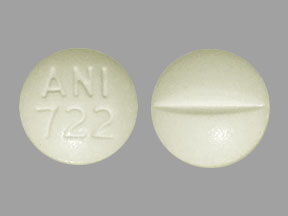
Terbutaline Coupons & Savings Card – Discount Prices from $41.50
Terbutaline is a medication used to manage and prevent breathing difficulties associated with asthma, chronic obstructive pulmonary disease (COPD), bronchitis, and emphysema. It belongs to the class of drugs known as bronchodilators and functions by relaxing the muscles around the airways, allowing them to open wider and facilitate easier breathing. Unlike many asthma medications, terbutaline is available as a tablet rather than an inhaler.
While it is effective in preventing and treating bronchospasm, terbutaline is not the first choice for immediate relief during an asthma attack. Some of the potential side effects include nervousness, tremors, and headaches. Additionally, it is not recommended for use during pregnancy due to potential risks to both the mother and baby. This medication was formerly sold under the brand name Brethine and is now available only as a generic option. Always consult a healthcare professional before starting any new medication to ensure it is appropriate for your condition.
Our coupons are free to use. Before paying, show the pharmacist your Terbutaline savings card to get your free discount. Use our filters below to edit the prescription box to match your needs. The Terbutaline prices will update based on your prescription needs. Above our Terbutaline coupons, you can change your location to see pharmacy prices and costs in other areas. We're here to help you buy Terbutaline at the lowest price with our prescription discount card.
My prescription
Edit
5MG, Terbutaline (30 Tablets)
Select pharmacy

CVS
$42.64
COUPON PRICE
Albertsons
$41.50
COUPON PRICE
Walgreens
$47.10
COUPON PRICE
Walmart
$60.12
COUPON PRICETerbutaline savings card
Show this card to your pharmacist
Albertsons
$41.50
BIN
ID
PCN
GRP
011867
LH1B907641
HT
LABH001
Powered by
Terbutaline is a medication used to manage and prevent breathing difficulties associated with asthma, chronic obstructive pulmonary disease (COPD), bronchitis, and emphysema. It belongs to the class of drugs known as bronchodilators and functions by relaxing the muscles around the airways, allowing them to open wider and facilitate easier breathing. Unlike many asthma medications, terbutaline is available as a tablet rather than an inhaler.
While it is effective in preventing and treating bronchospasm, terbutaline is not the first choice for immediate relief during an asthma attack. Some of the potential side effects include nervousness, tremors, and headaches. Additionally, it is not recommended for use during pregnancy due to potential risks to both the mother and baby. This medication was formerly sold under the brand name Brethine and is now available only as a generic option. Always consult a healthcare professional before starting any new medication to ensure it is appropriate for your condition.
Our coupons are free to use. Before paying, show the pharmacist your Terbutaline savings card to get your free discount. Use our filters below to edit the prescription box to match your needs. The Terbutaline prices will update based on your prescription needs. Above our Terbutaline coupons, you can change your location to see pharmacy prices and costs in other areas. We're here to help you buy Terbutaline at the lowest price with our prescription discount card.
Related short-acting beta agonists prescriptions
coupons from$1.01Save 93%
More prescriptions for copd
coupons from$10.38Save 69%
coupons from$417.61Save -32%
coupons from$216.71Save 87%
coupons from$512.15Save 72%
coupons from$9.31Save 22%
coupons from$260.79Save 74%
coupons from$51.84Save 90%
coupons from$1.45Save 97%
Related short-acting beta agonists prescriptions
Xopenex Save 93%coupons from $1.01
More prescriptions for copd
Arformoterol Save 69%coupons from $10.38
Serevent Diskus Save -32%coupons from $417.61
Symbicort Save 87%coupons from $216.71
Combivent Respimat Save 72%coupons from $512.15
N-acetyl Cysteine Save 22%coupons from $9.31
Striverdi Respimat Save 74%coupons from $260.79
Xopenex Hfa Save 90%coupons from $51.84
Acetylcysteine Save 97%coupons from $1.45
Terbutaline dosage forms
Use our Terbutaline 2.5MG coupon with prices from $12.10 for 6 Tablets. You can also use our Terbutaline 2.5MG coupon with prices from $15.30 for 8 Tablets. We have a Terbutaline 2.5MG coupon with prices from $36.65 for 30 Tablets. You can use our Terbutaline 2.5MG coupon with prices from $63.00 for 60 Tablets.
Dosage Quantity Price from Per unit 2.5MG 6 Tablets $12.10 $2.02 2.5MG 8 Tablets $15.30 $1.91 2.5MG 30 Tablets $36.65 $1.22 2.5MG 60 Tablets $63.00 $1.05 2.5MG 90 Tablets $81.34 $0.90 2.5MG 100 Tablets $87.46 $0.88 2.5MG 180 Tablets $136.39 $0.76 2.5MG 500 Tablets $332.10 $0.66 5MG 30 Tablets $42.64 $1.42 5MG 4 Tablets $14.08 $3.52
| Dosage | Quantity | Price from | Per unit |
|---|---|---|---|
| 2.5MG | 6 Tablets | $12.10 | $2.02 |
| 2.5MG | 8 Tablets | $15.30 | $1.91 |
| 2.5MG | 30 Tablets | $36.65 | $1.22 |
| 2.5MG | 60 Tablets | $63.00 | $1.05 |
| 2.5MG | 90 Tablets | $81.34 | $0.90 |
| 2.5MG | 100 Tablets | $87.46 | $0.88 |
| 2.5MG | 180 Tablets | $136.39 | $0.76 |
| 2.5MG | 500 Tablets | $332.10 | $0.66 |
| 5MG | 30 Tablets | $42.64 | $1.42 |
| 5MG | 4 Tablets | $14.08 | $3.52 |
| 5MG | 8 Tablets | $19.16 | $2.40 |
| 5MG | 60 Tablets | $66.97 | $1.12 |
| 5MG | 90 Tablets | $99.31 | $1.10 |
| 5MG | 100 Tablets | $107.42 | $1.07 |
| 5MG | 180 Tablets | $172.32 | $0.96 |
| 5MG | 500 Tablets | $431.90 | $0.86 |
